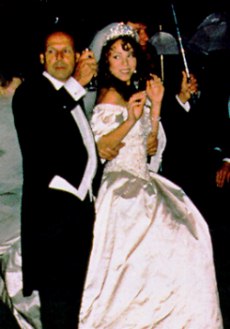

Aside from hip hop, Carey's current playlist ranges from Weezer to D'Angelo
to Hole. "When I began singing," she says, "there was an effort to portray
myself in a simple, classic way-to go the ballad route. I love singing ballads, and
I always will." Which makes sense, since she's got a ballad-friendly voice, and
her earliest influences were primarily divas.
Carey's first musical role model was her mother, Patricia Carey, a classically
trained mezzo-soprano who once sang with the New York City Opera. "I was
singing with my mom and her musician friends from the time I was about four
years old," Carey recalls. "I'd get home from school, and she would have, like,
five friends over who were jazz musicians, and I'd end up singing `My Funny
Valentine' at 2 in the morning."
So by comparison, starring in her sixth-grade production of The Sound of
Music didn't seem like a big deal. By high school, in fact, she wasn't
participating in any extracurricular programs. "I thought I was too cool to do
anything related to school activities," she says, laughing. "I thought I was the
tough chick of the school. But I think that stemmed from being insecure as a
kid."
She attributes her lack of confidence early on to several factors. First, her parents divorced when she was a toddler. Her
mother-who raised Mariah, her older brother, and her sister-led an erratic, job-hopping lifestyle that didn't provide the kids
with a lot of stability. "We moved all over Long Island and New York," Carey says. "There were times when we didn't have a
place to live and we stayed with her friends. Those were very frightening periods."
Carey pauses. She doesn't want to dis her mom, with whom she has a good relationship and who lives near Mariah in
Westchester. "My mother was supportive and encouraging of my singing. But she was... unconventional. Even though my mom
was my best friend and always there for me, I never felt exactly like her. Something always made me feel different from her."
Carey isn't just alluding to her mother's gypsylike existence. She's touching on another element central to her insecurity
complex: skin color. Patricia is full-blooded Irish-American, with blond hair; Carey's dad is a black Venezuelan. She has said
that racial tension contributed to the demise of her parents' relationship. It also had a profound and often unsettling impact on
the way Carey related to her mom and to her peers.
"I felt like an outsider," Carey says. "Not that being multiracial was a problem, but it was confusing. It made me feel separate
and different from everyone else. I could talk to my mother about it, but she could never relate to it 100 percent. No one could
unless they'd been through it. I used to wish I was just one thing or another, instead of a mixture of things."
Carey stares pensively at her wineglass. She wants to make sure she's expressing herself clearly and tactfully. "It's hard to
explain," she says. "Some people understand, and some get all critical and freaked-out about the whole thing. People get really
bent out of shape when I refer to myself as a multiracial person. I have to identify myself that way, because that's what I am.
Not to say so would be inaccurate."
Of course, the diversity of her fans suggests that all kinds of folks are willing to accept Carey, however she chooses to define
herself. She gets loads of airplay on radio formats that represent a variety of disparate audiences: young urban, Top 40, adult
contemporary, classic soul. Her music crosses rigidly enforced racial and cultural barriers. "I think it's great," she says. "I don't
think it has anything to do with my being multiracial-music goes beyond that. But being accepted by all [kinds of] people
makes me feel like I belong somewhere. And that makes everything I ever went through okay, you know what I mean? All that
matters is that I know who I am."
Next Page ---->
 Return to Mariah Carey articles
Return to Mariah Carey articles
 Looking In at Mariah
Looking In at Mariah